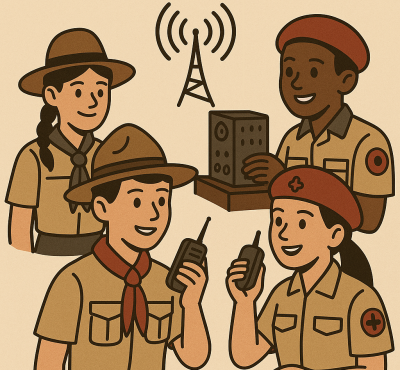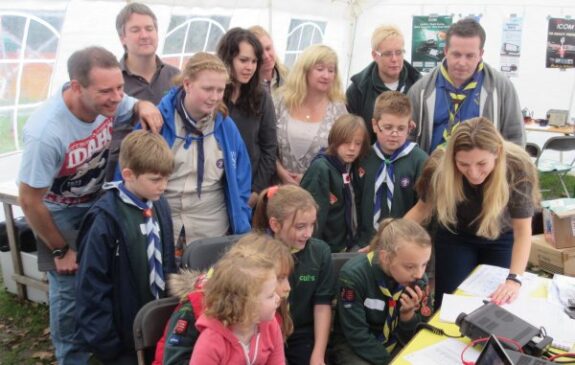We’ve been asked on a few occasions for advice on how to use our HamTrain Foundation training material to help prepare Scout, Guide or Cadet groups for the UK Foundation amateur radio exam. Here are a few ways that we can help.

Material for local training:
The better way of training a group is commonly in-person, either with the help of a local amateur radio club, or with one or two enthusiastic group leaders who already hold amateur radio licences.
Feedback to us shows that the challenging levels to get across are the electronics theory, transmitter block diagrams, antenna gain and remembering the licence conditions. Areas such as operating, propagation and safety present less of an issue.
Here’s what we offer that can potentially help:
- Foundation Training Slides – a comprehensive and free set of slides in various formats, for groups and clubs to run through in a classroom setting
- Foundation YouTube videos – for “homework study” between classroom sessions
- Subject videos – to help illustrate various points and practical items
- Course book – A low-priced book for many different platforms focusing on how to pass the exam
- Mock book – A book of mock tests, for revision before the exam
- Revision material – Shortened versions of our study material, for pre-exam revision
Online Training
If it’s not possible to run an in-person training session for the group in question, then potentially they could study using our free online course. Here’s an example of how it would work for a group:
We run courses once or twice a month. Courses are free. There are 9 modules in total, and we release 3 modules per week that can be tackled any time (no live lessons or webcams). There is a mini-mock in the middle, and a complete mock at the end, to see if a student is ready for the exam. Here’s a possible way this could be used:
- Ask your group to pick a course start date that works for them. Make sure everyone has access to a computer. has their own email address, and has 2-3 hours a week to spend on the course
- Get each student to enrol on the course. After completing the application form and confirming a place, they’ll get a confirmation
- In the week before the course starts, set the expectations, talk about what’s coming up, and get them ready to start
- Students will all get access at the same time. Encourage the students to chat to each other between lessons, and bring any questions up at the next in-person group meeting. Provide help and practical support on the topics as may be needed
- Towards the end of the course, get a feel for progress and confidence level
- At the end of our 3-week course is a 26-question mock test. The exam pass mark is 19/26. Check mock scores, and for those with a decent pass score, consider booking an RSGB Foundation exam – these can either be taken individually at home online, or in person at an approved exam venue
- As the group meeting before the exam, run through some last-minute mocks with the group and review some exam hints and tips
(If it’s helpful, we have a demo classroom that tutors / leaders can take a peek at)
Things to be aware of:
We’ve cooperated with several cadet and scout groups in the past, and have seen a pattern that leaders / tutors may want to watch for:
- Getting a group of youngsters ready to start on the same day is ‘challenging’. Some will forget, some won’t have a computer, some won’t be allowed or able to use a computer, some won’t have discussed it with their parents.
- Motivation: Not every member of a group is motivated to study. Some will just stop, blame technology, or more commonly, not read the study material, attempt a quiz just before the next meeting, and lose interest due to a low score
- A good percentage just stop, but don’t say anything – whether they’re finding the material too hard, or aren’t motivated, it happens more than you’d expect
- Without a local leader, trainer or parent driving students forward, checking progress and ‘pushing’, interest tails off towards the end of week 2
- Expect only a small percentage to make it to the end without support and chasing
- We’d suggest promoting “wireless technology”, and “radio principles” – sadly, amateur radio is not always a hugely appealing topic for youngsters
Some handy links and resources
- Online registration for our online course
- List of course modules and course running order
- Foundation Study Guide – Manual that aligns with the course material – possibly useful for group leaders, training supporters and parents
- Foundation Mock Tests book – A book of mock tests, for revision before the exam
- RSGB exam booking info
- Revision material – Shortened versions of our study material, for pre-exam revision
- Exam Hints and Tips

Got a question or suggestion? See our course and exam FAQ, or ask below.


